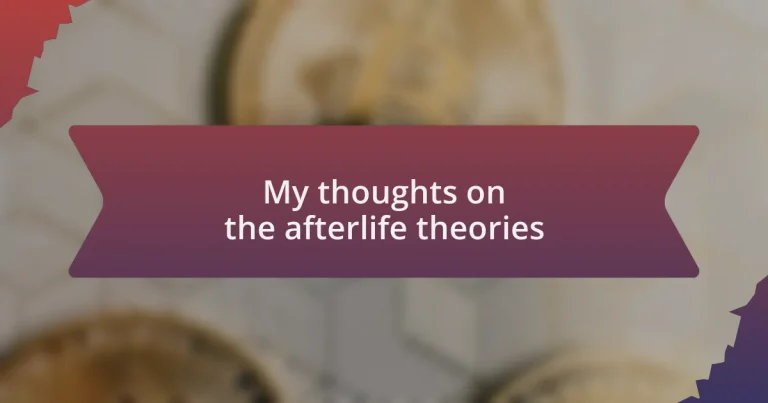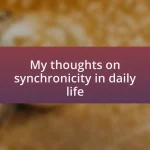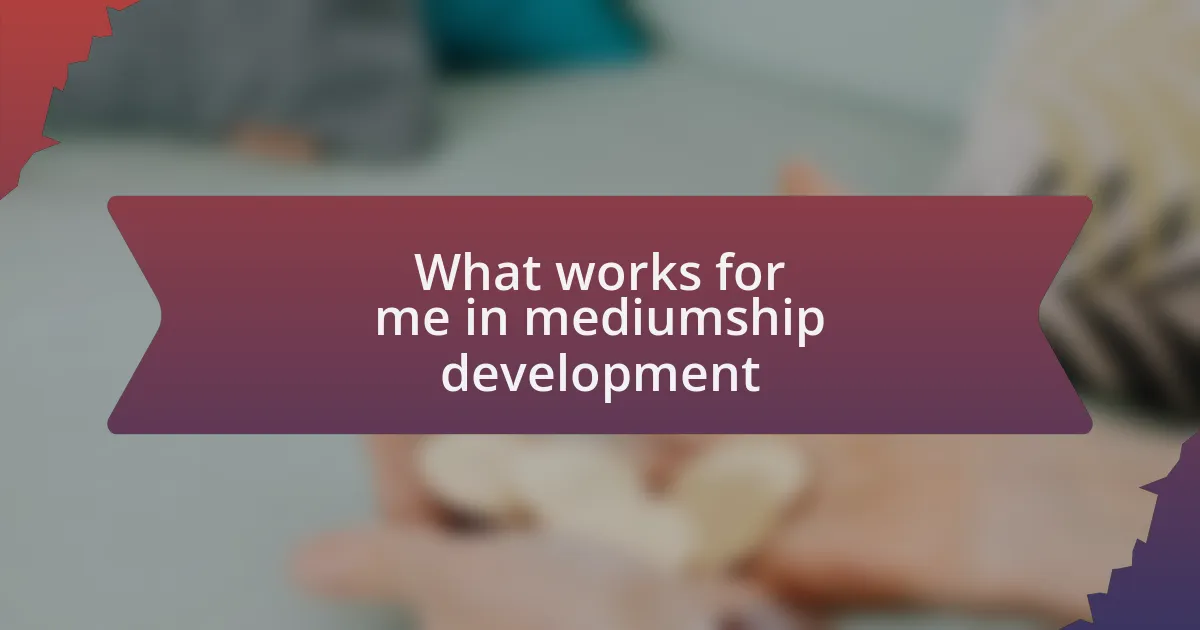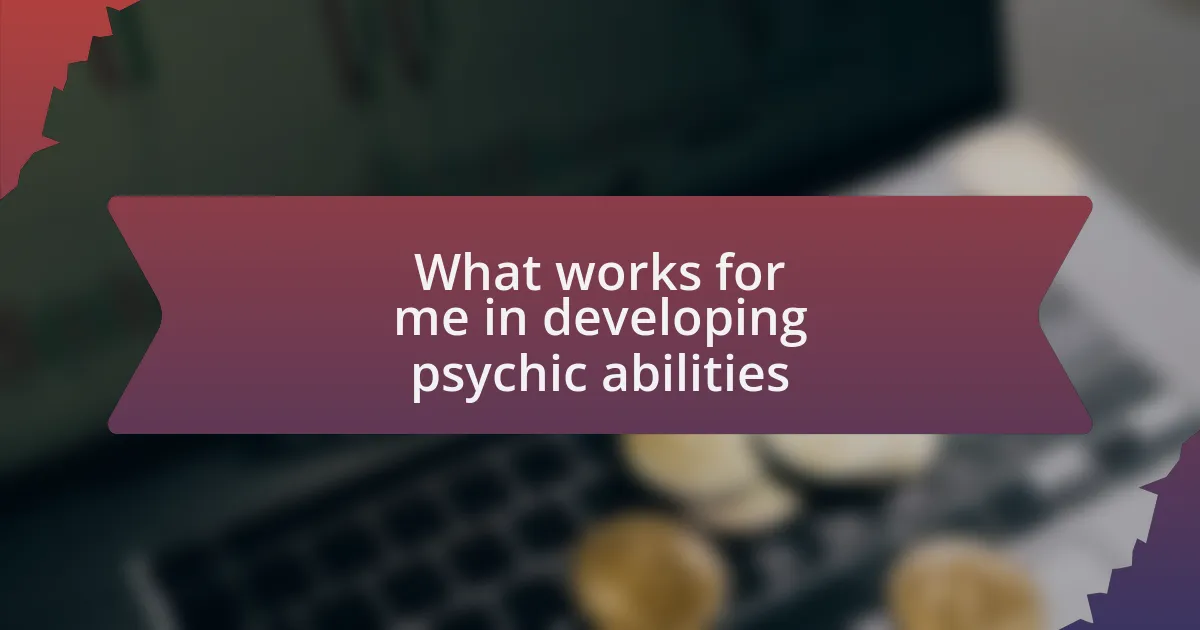Key takeaways:
- Theories of afterlife vary widely across cultures, with concepts like reincarnation and realms of consciousness offering different perspectives on existence beyond death.
- Personal experiences and reflections, such as sensing the presence of deceased loved ones or near-death accounts, shape individual beliefs about the afterlife.
- Case studies, including children’s past life memories and electronic voice phenomena, challenge the line between belief and skepticism regarding communication with the deceased.
- Exploring afterlife theories emphasizes the significance of legacy and connections maintained with loved ones, suggesting emotions may transcend physical existence.
Author: Evelyn Hartman
Bio: Evelyn Hartman is a contemporary author known for her evocative storytelling and rich character development. With a background in psychology, she weaves intricate narratives that explore the complexities of human relationships and personal growth. Her debut novel, “Whispers in the Wind,” garnered critical acclaim and established her as a powerful voice in modern literature. Evelyn resides in the Pacific Northwest, where she draws inspiration from the vibrant landscapes and diverse communities around her. When she’s not writing, she enjoys hiking, gardening, and spending time with her two rescue dogs.
Understanding the afterlife theories
When exploring afterlife theories, I often find myself reflecting on my own experiences with loss. For instance, after losing a close friend, I was drawn to the idea of reincarnation; the thought that our souls might be reborn brings a sense of comfort. It opens the door to questions like, do we carry our memories with us?
The concept of an afterlife varies tremendously across cultures and beliefs, each proposing its own narrative about what happens next. I remember attending a culture-rich festival where they celebrated the Day of the Dead, showcasing vibrant altars and heartfelt remembrances. This experience made me ponder—could these rituals actually influence the way we perceive our connections with those who have passed?
I also think about the scientific perspective, especially when discussing near-death experiences. Many claim to have encountered a “light” or felt an overwhelming sense of peace. Is it merely a brain’s response to distress, or could it hint at something beyond our physical existence? This ambiguity intrigues me and keeps the conversation around afterlife theories ever-evolving.
Exploring paranormal beliefs
When I dive into the realm of paranormal beliefs, I often find myself fascinated by the myriad ways people connect with the concept of spirit communication. I once attended a workshop focused on mediumship, where participants shared stories about how they felt their loved ones guiding them through tough choices. It made me wonder: are those subtle signs truly messages from the beyond, or does our mind create them as a coping mechanism?
Exploring these beliefs, I have encountered rituals designed to honor and invoke spirits. In my experience, lighting a candle and setting an intention can shift the atmosphere, making it feel as though I’m in direct conversation with the unseen. This practice prompts me to ask if these rituals serve simply as a bridge for comfort, or if there really is a deeper connection waiting to be uncovered.
The fascination with hauntings and ghostly encounters often evokes a mix of fear and curiosity in me. I’ve always been intrigued by a local legend of a haunted house in my neighborhood. Hearing tales from those who claimed to see apparitions made me curious—what drives people to share these experiences? Perhaps there is an aspect of the human condition that craves connection, even with the past.
Popular afterlife theories discussed
One of the most popular afterlife theories is reincarnation, which suggests that our souls are reborn into new bodies after death. I remember reading about a child in Asia who recalled details of a past life with such specificity that researchers were left astounded. This theory invites a thought-provoking question: if our souls are on an endless journey, what lessons are we destined to learn over multiple lifetimes?
Another intriguing perspective is the idea of an afterlife as a realm of pure consciousness. I once attended a lecture where the speaker described this state as a merging with universal energy. It made me ponder—what if our existence here is just a fleeting glimpse of a much larger reality that we can only begin to fathom? This notion challenges my understanding of life itself, suggesting that perhaps our purpose is intertwined with an infinite tapestry of experiences.
Then there’s the concept of the ‘Summerland,’ a term often used in spiritualist circles, referring to a peaceful plane where souls reside after death. I can’t help but feel a sense of comfort in imagining this serene space filled with love and light. Is it not a profound thought that our loved ones may be waiting for us there, exploring a tranquil existence while guiding us from afar?
Case studies on afterlife experiences
One compelling case study involves a well-documented account of a near-death experience (NDE) reported by a man who claimed to have seen his deceased father during a brief medical emergency. He described the encounter in vivid detail, articulating feelings of overwhelming love and peace. It made me wonder, does this connection we feel transcend our physical existence, hinting at a deeper bond that continues even after death?
Another fascinating instance is the research surrounding children who recall past lives, like the famous case of a boy who spoke of memories from a life in another country. He identified names, places, and events that were later verified. Such stories make me reflect on the possibility that our identities might be more interconnected than we think—could it be that our experiences shape us beyond the confines of a single lifetime?
Lastly, I recall studying a case involving electronic voice phenomena (EVPs) captured during paranormal investigations, in which spirits purportedly communicated using recorded audio. Some of these messages included specific details from the lives of the deceased, acknowledged and confirmed by their loved ones. It raises the question: are these glimpses into the afterlife genuine interactions or simply coincidences? This ambiguity often leaves me pondering the thin line between belief and skepticism.
Personal reflections on afterlife
When I reflect on my own beliefs about the afterlife, I often find myself returning to moments when I sensed a presence long after someone close to me passed away. There was a time after my grandmother’s funeral when I distinctly felt her warmth beside me while I was sifting through her belongings. Was it simply my imagination, or could it be that those we lose stay with us in some intangible way?
I remember discussing the afterlife with a friend who had a profound near-death experience. She described what she called “the light,” saying it felt like unconditional love wrapped around her. Hearing her recount that moment made me question the boundaries of existence. Could it be that these experiences shape our understanding of what lies beyond?
Thinking back on my late uncle’s stories about visiting the graves of his ancestors, I realize how much those tales affected my own views. He spoke of them as guardians watching over the family. It makes me wonder if perhaps there’s a world where our loved ones guide us, shaping our paths with their unseen support. What if the afterlife is not just about existence after death but also about the connections we maintain—even in their absence?
Lessons learned from afterlife theories
Theories about the afterlife often remind me of the moments we share with our loved ones. I once attended a memorial service where a close friend shared stories of his parents and how their love continues to inspire him. This made me realize that perhaps every story passed down isn’t just a memory; it’s a thread connecting us beyond the veil of death.
One lesson I’ve gleaned from exploring these ideas is the importance of legacy. My mother would always say that the true measure of our lives is how we impact others, and reflecting on her words, I question: what footprints are we leaving behind? It’s fascinating to think of our choices creating ripples that extend far beyond our time on Earth.
Sometimes, while contemplating these afterlife theories, I find myself wondering about the nature of our emotions. I remember feeling an overwhelming sense of peace when I visited a friend’s grave, as if getting in touch with their spirit brought solace. Could this suggest that our feelings—love, grief, and joy—transcend our physical existence and create a deeper connection with those who have passed?





